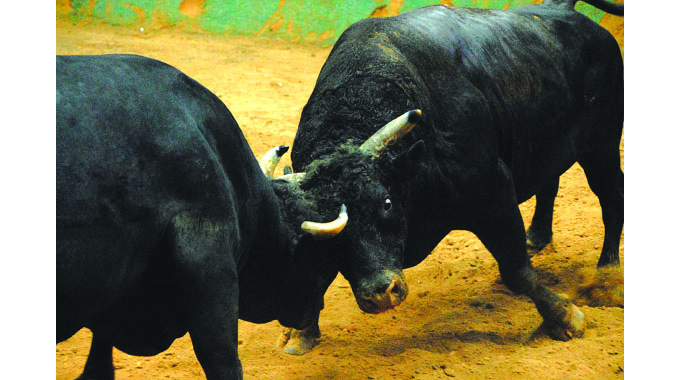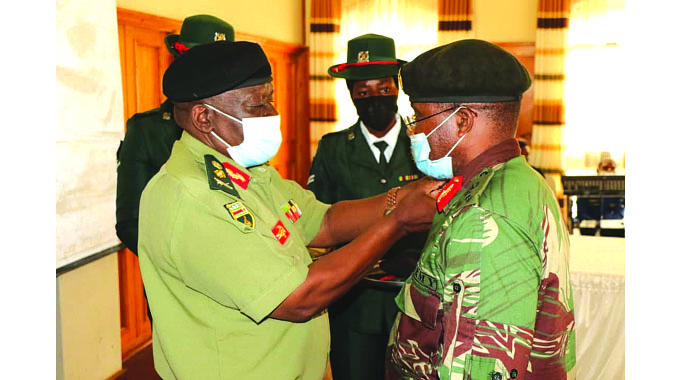How bullfights led owners to boxing rings at the pastures

Isdore Guvamombe
Saturday Lounge Reflections
The two big bulls re-engaged. There was pushing and knocking of horns. It was a big fight. Alexio cheered on as this villager’s bull looked cornered for a while. Somehow it recovered, rather miraculously and pushed harder, delivering a head butt, a horn, another head butt, a left horn, right horn … combination, left horn, right horn, then another combination and Alexio’s bull took to its heels, tail up, turned back after some distance and shook its head, and galloped off in staggering gait. The fight was over.”
Under the blistering mid-morning heat, I set off herding cattle towards the bend on Mupinge River, aptly named Gonyo, the Korekore dialect for a bend.
My bare feet and legs caked with knee-high cow dung paste, acquired from entering the kraal to drive out cattle, themselves the beasts that endured long nights in knee high dung and mud paste.
It was towards the end of the rainy season and the kraal was a spectacular rut of cowdung paste.
White worms and maggots frolicked in the paste, but they never harmed this villager. Flies hovered and somersaulted, unabated.
After driving the cattle out of the kraal, they took the route to Gonyo and this villager intermittently stopped to remove one or two irritating worms, the grass would do the rest of the cleaning.
Gonyo was a sacred and scary grazing pasture, but I had to herd cattle.
It was vast with dense vegetation. Like any boy of his age, this villager had a catapult round his neck and a small axe in one hand. Those were enough weapons in case of trouble.
Three dogs, Mukuru Haadaro, Tsoka Dzehwahwa and Danger, followed and were handy security.
The cattle were fat and looking good. The riverine vegetation was thick and at times lions were spotted there. But the belief was that they were not real lions, but the spirit mediums that manifested themselves through the lions. Mhondoro! They never attacked cattle or humans, unless you broke taboos.
All the same it was scary and hair-splitting. It chilled the spine, just at a thought.
Karitundundu, the ageless village autochthon of wisdom and knowledge had set simple rules. Once you followed those and avoided breaking taboos, you were safe. Very, very safe!
As this villager drove the cattle deeper and deeper into Gonyo, there was the timid smell of rapoko. Across the river were distant clanging cattle bells. Boys from across the Mupinge River were also herding cattle.
The bell sounds were different from those of our cattle. It was hard to keep the eye on the cattle in the tall thriving vegetation. If the villager lost one beast, that night hell would break loose.
Grandfather never wanted that kind of nonsense. He would never tolerate losing one cow for a night. He would flog your behind into submission.
By the river, the cattle suddenly mixed. The huge bulls sized each other up, sniffing at the behinds of cows, mooing and spattering dung.
Small bulls — the teaser bulls — mooed, jumped and smashed bushes with their small horns.
They fought anthills as mock enemies, spattered dung all over and egged the big ones to fight. They were urging the two huge bulls to fight.
Alexio was herding the other cattle and typical of the mantra of that time, he wanted his bull Captain to fight this villager’s bull, Bhusumani (bushman).
Both bulls were equally fit, muscular, stubborn and stout. Eventually the big fight started.
At some stage, the horns seemed to have been used to breaking point. They disengaged, starred at each other momentarily, fretting and panting.
The two big bulls re-engaged. There was pushing and knocking of horns. It was a big fight. Alexio cheered on as this villager’s bull looked cornered for a while.
Somehow it recovered, rather miraculously and pushed harder, delivering a head butt, a horn, another head butt, a left horn, right horn … combination, left horn, right horn, then another combination and Alexio’s bull took to its heels, tail up, turned back after some distance and shook its head, and galloped off in staggering gait. The fight was over.
Unbeknown to this villager, more boys from Alexio’s village had arrived.
They equally enjoyed the bull fight, albeit from a distance.
After the bull fight they closed in and started shouting; “The bull fight is over what about the owners?”
They turned to this villager; “Your bull has won, but you will not win a fight against Alexio! Will you?”
Naturally there had been a grudge between grandfather on one side of the Mupinge River and Alexio’s father on the other. Grandfather was by far known as a calm, composed, calculative and successful farmer.
Alexio’s father was known as a drunkard and lazy man who survived on stealing firewood from grandfather and selling it to teachers at the school.
By that token and by the bulls’ fight, there was a cause to fight for.
Takawira, the eldest of the boys from the village, was very fast in organising the fight.
Using his two hands he moulded two sets of breasts on the ground.
“Iwe zamu ramai vako” (your mother’s breast) and “iwe zamu ramai vako” (own mother’s breast.
We both used our feet to kick destroy mounds of sand and hence the breasts and the fight exploded. It is difficult to describe your own fight.
But within moments, this villager had floored Alexio. How? Up to now the villager has no clue. All this villager knows is throwing around punches and kicks with reckless abandon.
Alexio’s young brother joined in, but Takwaria would have none of it. It was enough. The fight continued. Alexio stood up, more determined to turn the tables, this villager received an upper cut and saw stars. Then someone stopped the fight.
It was one farmer Mr Chizema. Both of us had bloodied nose and swollen faces. The anger was still there but Mr Chizema separated and dispersed all of us. We were to fight another day, because back in the village in the land of milk, honey and dust elders with cotton tuft hair say, he who runs away from a fight, will have to fight another day.










Comments